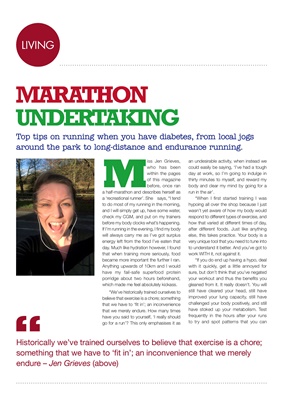
LIVINGLIVING
MARATHON
UNDERTAKING
Top tips on running when you have diabetes, from local jogs
around the park to long-distance and endurance running.
M
iss Jen Grieves,
who has been
within the pages
of this magazine
before, once ran
a half-marathon and describes herself as
a 'recreational runner'. She says, "I tend
to do most of my running in the morning,
and I will simply get up, have some water,
check my CGM, and put on my trainers
before my body clocks what's happening.
If I'm running in the evening, I find my body
will always carry me as I've got surplus
energy left from the food I've eaten that
day. Much like hydration however, I found
that when training more seriously, food
became more important the further I ran.
Anything upwards of 10km and I would
have my fail-safe superfood protein
porridge about two hours beforehand,
which made me feel absolutely kickass.
"We've historically trained ourselves to
believe that exercise is a chore; something
that we have to 'fit in'; an inconvenience
that we merely endure. How many times
have you said to yourself, 'I really should
go for a run'? This only emphasises it as
an undesirable activity, when instead we
could easily be saying, 'I've had a tough
day at work, so I'm going to indulge in
thirty minutes to myself, and reward my
body and clear my mind by going for a
run in the air'.
"When I first started training I was
hypoing all over the shop because I just
wasn't yet aware of how my body would
respond to different types of exercise, and
how that varied at different times of day,
after different foods. Just like anything
else, this takes practice. Your body is a
very unique tool that you need to tune into
to understand it better. And you've got to
work WITH it, not against it.
"If you do end up having a hypo, deal
with it quickly, get a little annoyed for
sure, but don't think that you've negated
your workout and thus the benefits you
gleaned from it. It really doesn't. You will
still have cleared your head, still have
improved your lung capacity, still have
challenged your body positively, and still
have stoked up your metabolism. Test
frequently in the hours after your runs
to try and spot patterns that you can
Historically we've trained ourselves to believe that exercise is a chore;
something that we have to 'fit in'; an inconvenience that we merely
endure - Jen Grieves (above)"